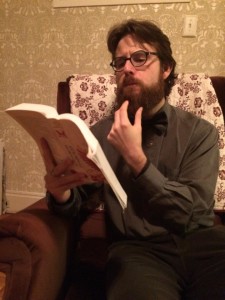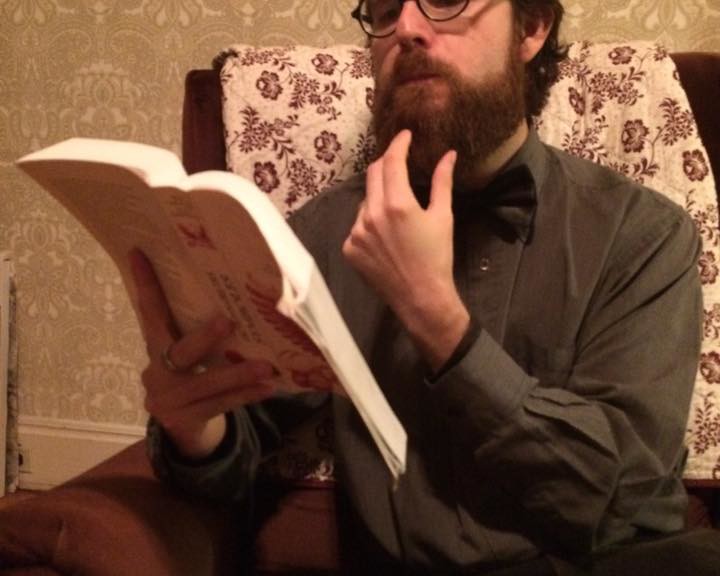Since its launch, Sacred & Sequential has been exclusively an English-language site for the scholarly consideration of religion and comics. Now, with the new year here,
S&S is expanding into French-language coverage as well, thanks to the skills of our own Etienne Domingue.
Founding Member A. David Lewis spoke with Etienne about the launch of Sacré & Séquentiel:
A. David Lewis: What makes Sacré & Séquentiel necessary? I mean, why not just shoot the old posts through Google Translate?
 Etienne Domingue: Whereas automated translation has made great strides in recent years, human languages remain somewhat beyond the grasp of machine intelligence. Errors in automated translation abound: computers are notoriously bad at translating idioms, and they don’t typically have much of an ear for tone or subtext. I suspect this has contributed to comics writers’ exceedingly poor handling of foreign languages — I am frequently shocked by how some anglophone writers assume that word-for-word translation is “good enough,” as though all of syntax and grammar operates in roughly the same way. It does not. Even culturally-sensitive writers make this mistake: G. Willow Wilson’s Air is magnificent, but its French is awful.
Etienne Domingue: Whereas automated translation has made great strides in recent years, human languages remain somewhat beyond the grasp of machine intelligence. Errors in automated translation abound: computers are notoriously bad at translating idioms, and they don’t typically have much of an ear for tone or subtext. I suspect this has contributed to comics writers’ exceedingly poor handling of foreign languages — I am frequently shocked by how some anglophone writers assume that word-for-word translation is “good enough,” as though all of syntax and grammar operates in roughly the same way. It does not. Even culturally-sensitive writers make this mistake: G. Willow Wilson’s Air is magnificent, but its French is awful.
I’m sure it’s only a matter of time before human translators — along with all humans, really — are obsolete, but for now this is not the case. I pray that when it is the case, our robot overlords will be merciful.
I believe Sacré & séquentiel is important because francophone interest in American comics exists despite a dearth of francophone literature on the subject.
ADL: What brought you to comics studies? Specifically, where do you tend to focus in terms of the medium and religious studies as well?
ED: I stumbled into Comics Studies by way of Contemporary Religious Studies. I came into Contemporary Religious Studies by following the path of least academic resistance after completing BAs in Religion and Psychology. My first master’s project had actually nothing to do with comics: I was going to study religious identity in connection with mental health, but an overzealous ethics board vociferously objected to this kind of work. I turned to Comics Studies out of spite. I still feel like an impostor because my training in textual analysis and criticism has been limited to exegetical scholarship until recently.

I have a life-long interest in fantasy, mythology, and narrative in general — but my interest in comic books developped relatively late. I read quite a few bandes dessinées as a child (probably all of Tintin, certainly most of Astérix) but American comics didn’t really feature into my upbringing. I discovered comics in college when a friend lent me Sandman; I subsequently graduated to The Invisibles. I quickly discovered my suspicions towards American genres were unfounded, and gradually extended my purview to eventually include mainstream superhero comics.
So far my own work has focused on applying Marshall McLuhan’s ideas to implicit and explicit religious contents in superhero narratives. In the future I hope to use his non-reductive approach to meaning in other contexts, and to explore the conceptual overlap between his work and that of his predecessors and successors. I feel very strongly that the digital age needs more (and better) hermeneutics.
ADL: What’s the landscape of religion and comics in francophone scholarship like?
ED: There is at the moment no real francophone equivalent to Comics Studies or even Pop Culture Studies: though francophone anthropological and philosophical academic discourse has abolished much of the conventional snobbery of serious vs. frivolous topics, there isn’t a systematic effort to clarify the disciplinary and epistemological framework for this kind of research. BDs have always enjoyed more prestige than American comics — they have never suffered anything like Fredric Wertham’s witch hunt — but scholarly study of this sort of material has been approached as an extension of French literary criticism to the graphic narrative, or else as a fresh multidisciplinary effort with little connection to existing scholarship. I believe that more communication between scholars interested in graphic narratives might increase awareness to theoretical and disciplinary approaches which might cause more diverse and poignant meanings to come to the fore.
ADL: Are there challenges inherent to this kind of work, reworking Sacred and Sequential into Sacré & Séquentiel? (Or is “reworking” not the right word?)
ED: Certainly. The ordinary problems of translation are compounded by a lack of terminological equivalence. For example, it is possible to talk of comics in the broad sense — in the sense of graphic narratives regardless of genre and provenance, and to consider this as the category wherein American comics, bandes dessinée and mangas get grouped together. But there are instances where this kind of amalgamation would distort the message of the scholarship. In my own work (in French) I use the English word comics to stress that I am working on material from the English-speaking world which is published according to a certain model; I do not use the generic French term for graphic narratives (that is: bandes dessinées or BD) because it has different connotations. It is sometimes relevant to state that symbolic lexicons, physical formats, and publishing schedules are specific to certain media — but these considerations are not always germane to the argument. The appropriateness of a word may therefore depend on the purpose of a communication or its intended audience.
ADL: What do you see in store for this first year of Sacré & Séquentiel?
ED: My hope is to make what I consider to be some of the most thought-provoking research on religion and graphic narratives available to my French-speaking peers and, conversely, to give past and future francophone scholarship a degree of visibility in the English-speaking world. Plan A is to begin by translating existing posts to garner the interest of francophone colleagues all over the globe. Plan B involves forbidden magicks and dinosaurs.
Related
 Etienne Domingue: Whereas automated translation has made great strides in recent years, human languages remain somewhat beyond the grasp of machine intelligence. Errors in automated translation abound: computers are notoriously bad at translating idioms, and they don’t typically have much of an ear for tone or subtext. I suspect this has contributed to comics writers’ exceedingly poor handling of foreign languages — I am frequently shocked by how some anglophone writers assume that word-for-word translation is “good enough,” as though all of syntax and grammar operates in roughly the same way. It does not. Even culturally-sensitive writers make this mistake: G. Willow Wilson’s Air is magnificent, but its French is awful.
Etienne Domingue: Whereas automated translation has made great strides in recent years, human languages remain somewhat beyond the grasp of machine intelligence. Errors in automated translation abound: computers are notoriously bad at translating idioms, and they don’t typically have much of an ear for tone or subtext. I suspect this has contributed to comics writers’ exceedingly poor handling of foreign languages — I am frequently shocked by how some anglophone writers assume that word-for-word translation is “good enough,” as though all of syntax and grammar operates in roughly the same way. It does not. Even culturally-sensitive writers make this mistake: G. Willow Wilson’s Air is magnificent, but its French is awful.
